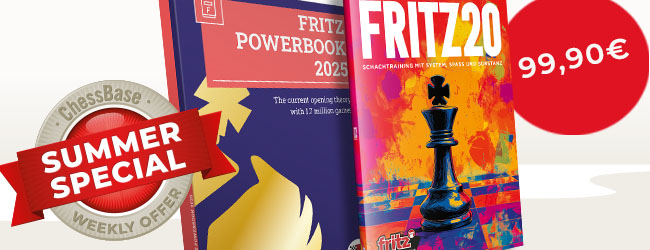Dennis Monokroussos writes: As another world championship (of some
sort!) winds down and we see the heights of contemporary chess, let’s
take a time out to see where we’ve come from. The first official world
chess championship took place in 1886, and tonight we’ll talk about the
history of the highest title and take a look at the first game of the first
match, between Zukertort and Steinitz. The game is an interesting mélange
of the old and new; instructive, entertaining, and a milestone worth revisiting.
Tune in and enjoy!
Dennis Monokroussos' Radio
ChessBase lectures begin on Mondays at 9 p.m. EDT, which translates
to 02:00h GMT, 03:00 Paris/Berlin, 13:00h Sydney (on Tuesday). Other
time zones can be found below. You can use Fritz
or any Fritz-compatible program (Shredder, Junior, Tiger, Hiarcs) to
follow the lectures, or download a free
trial client. |
Here are the exact times for different locations in the world
* indicates that the place is currently observing daylight saving time
(DST)
 Dennis
Monokroussos is 37, lives in South Bend, IN (the site of the University
of Notre Dame), and is writing a Ph.D. dissertation in philosophy (in the philosophy
of mind) while adjuncting at the University.
Dennis
Monokroussos is 37, lives in South Bend, IN (the site of the University
of Notre Dame), and is writing a Ph.D. dissertation in philosophy (in the philosophy
of mind) while adjuncting at the University.
He is fairly inactive as a player right now, spending most of his non-philosophy
time being a husband and teaching chess. At one time he was one of the strongest
juniors in the U.S., but quit for about eight years starting in his early 20s.
His highest rating was 2434 USCF, but he has now fallen to the low-mid 2300s
– "too much blitz, too little tournament chess", he says.
Dennis has been working as a chess teacher for seven years now, giving lessons
to adults and kids both in person and on the internet, worked for a number
of years for New York’s Chess In The Schools program, where he was
one of the coaches of the 1997-8 US K-8 championship team from the Bronx, and
was very active in working with many of CITS’s most talented juniors.
When Dennis Monokroussos presents a game, there are usually two main areas
of focus: the opening-to-middlegame transition and the key moments of the middlegame
(or endgame, when applicable). With respect to the latter, he attempts to present
some serious analysis culled from his best sources (both text and database),
which he has checked with his own efforts and then double-checked with his
chess software.


















 Dennis
Monokroussos is 37, lives in South Bend, IN (the site of the University
of Notre Dame), and is writing a Ph.D. dissertation in philosophy (in the philosophy
of mind) while adjuncting at the University.
Dennis
Monokroussos is 37, lives in South Bend, IN (the site of the University
of Notre Dame), and is writing a Ph.D. dissertation in philosophy (in the philosophy
of mind) while adjuncting at the University. 




